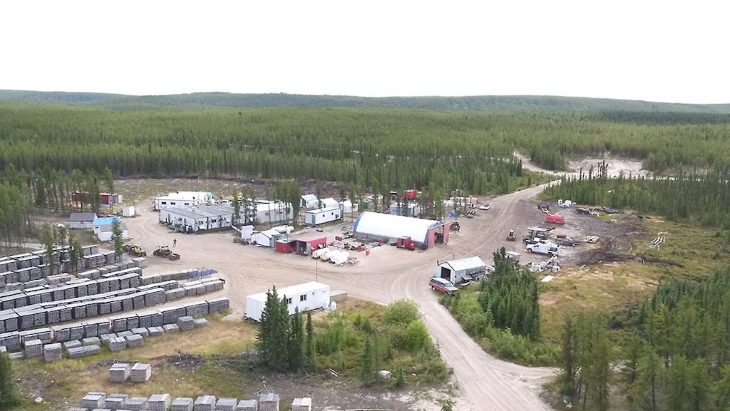Denison Mines has received approval from the Saskatchewan Minister of Environment to prepare, construct and operate the facilities required to carry out the in-situ leach (ISL) feasibility field test planned for the Phoenix deposit at the Wheeler River uranium project.

The Wheeler River exploration camp (Image: Denison Mines)
The feasibility field test (FFT) is designed to use the existing commercial-scale ISL test pattern, installed at Phoenix in 2021, to facilitate a combined assessment of the deposit's hydraulic flow properties with the leaching characteristics that have been assessed through the metallurgical core-leach testing programme. Overall, the FFT is intended to provide further verification of the permeability, leachability, and containment parameters needed for the successful application of the ISL mining method at Phoenix and is expected to validate and inform various feasibility study design elements - including the production and remediation profiles expected for the project.
The approval granted by the Minister of Environment authorises Denison to operate "pollutant control facilities", including mineralised precipitate facilities, radon air pollution abatement equipment, and hazardous substances and waste dangerous goods storage facilities. The approval followed the completion of a process involving the review of and consultation on the company's permit application and supporting materials related to the FFT.
Toronto-based Denison said preparation and construction of the FFT facilities "are now fully authorised and are expected to commence shortly". It noted the temporary surface facilities required to complete the FFT are planned to be installed at the Phoenix site during the third quarter of 2022. Denison added, "The majority of the test activities ... will occur within an estimated 60-day operating time frame, with the construction and placement of temporary facilities commencing approximately two months prior to the commissioning of the test facilities and initiation of the leaching phase".
The Canadian Nuclear Safety Commission has determined that a Nuclear Substance Licence is also required for Denison to possess and store the mineralised solution containing uranium resulting from the operation of the FFT. Denison said it expects to receive the licence before the site preparation and commissioning activities are completed.
Kevin Himbeault, Denison's vice president of plant operations and regulatory affairs, welcomed the receipt of the minister's approval. "This is a significant advancement for the FFT, which is a key step in the process of de-risking the proposed Phoenix ISL uranium mining operation and is expected to provide important details to support the ongoing feasibility study," he said.
"The FFT represents a first-of-its-kind test of a uranium mining method that is new to Canada," added Denison President & CEO David Cates. "Successfully navigating the regulatory environment in Saskatchewan to develop conditions for the oversight of a novel advanced field test is a notable accomplishment for both the Denison team and the regulatory team from the Ministry of the Environment."
Wheeler River is a joint venture between Denison (90% and operator) and JCU (Canada) Exploration Company Limited (10%), with combined indicated mineral resources of 132.1 million pounds U3O8 (50,812 tU) and inferred resources of 3.0 million pounds U3O8. The project - in the Athabasca Basin region of northern Saskatchewan - is estimated to have mine production of 109.4 million pounds U3O8 over a 14-year mine life.
Researched and written by World Nuclear News